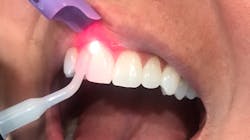What type of training do dental hygienists need to use lasers?
Editor's note: Published January 25, 2023. Updated February 1, 2023.
Now that you know what dental lasers are and what they can do, it’s time to look into training and certification options. Each state has rules and regulations that must be followed. As a dental hygienist, you are responsible for your license. It’s up to you to interpret your State Practice Act. Many times, we listen to others only to find out that we should have looked into other options first before using a certain tool.
Laser regulations in each state
States that allow lasers for dental hygienists in their scope of practice, each with written regulations:1
Arkansas, California, Colorado, Idaho, Illinois, Indiana, Iowa, Kentucky, Maryland, Minnesota, Nevada, North Dakota, Pennsylvania, South Carolina, Tennessee, Texas, Utah, Vermont, Virginia, West Virginia, Wisconsin (doesn't allow use on herpetic lesions), Wyoming
States that have not yet addressed lasers directly and don’t have any rules or regulations for them:1
Alaska, Connecticut, Delaware, District of Columbia, Hawaii, Kansas, Maine, Massachusetts, Michigan, Missouri, Montana, Nebraska, New Hampshire, New Mexico, New York, Oklahoma, Oregon, Rhode Island, South Dakota, Washington
This doesn’t mean you can’t use lasers in these states; it just means that their stance on lasers may change someday, and you’ll need to stay abreast of those changes.
States that specifically say hygienists are not allowed to use lasers:1
Alabama, Florida, Georgia, Louisiana, Mississippi, New Jersey, North Carolina, Ohio
You may also be interested in:
- So, you want to be a laser dental hygienist?
- Which dental laser should you choose, and what can you use it for?
Training and certification
Once you’ve determined that your license will allow you to use lasers, you’ll need to look at the different types of training and certifications you may need. As you begin your journey as a laser hygienist, start by familiarizing yourself with the different types of lasers that are available and what each of them can do. From there, decide what you want to do with your laser. Watch webinars, read articles, and find someone you can shadow or use as a mentor.
There are several types of courses you can take. Make sure they are from reputable providers. Unfortunately, there are some who facilitate their own courses without regulation or monitoring. The courses you take should have tutorial sections, live hands-on activities, and some type of testing at the end to demonstrate competency.
Other things to consider
Remember, if you can’t do a particular procedure under your current dental hygiene license, then you can’t do it just because you have a laser either. Here’s an example: as hygienists, we aren’t licensed to perform a gingivectomy, and even if we are trained in the use of lasers, we still cannot provide that treatment. The laser is just an additional tool, and there isn’t a CDT code for lasers. Lasers are used in conjunction with other tools during a dental procedure.
We may hear that insurance will pay for lasers, but it’s important to become familiar with the specific plan your office has a contract with to make sure you can charge patients the difference in costs. This is often not allowable, and we must write off the difference. Keep in mind that a laser isn’t used as a tool to make more money, but instead a tool to provide the best treatment for patients. This may include better outcomes, faster healing, and high-tech tools that your office uses for amazing results. “If you build it, they will come.”
A good source of information is the Academy of Laser Dentistry’s website. You’ll find a lot of information on lasers and various courses that are available. Some instructors provide courses at the larger dental meetings. Some of these courses are open to hygienists and dentists, in addition to private ones.2
You can become a member of laser organizations to stay current with the most recent information on lasers. The Academy of Laser Dentistry also offers (at no cost to hygienists) the option to be involved in a hygiene mentorship program that offers one-hour laser webinars with interactive Q&A sections. You can be assigned to a hygienist from a panel of seven who will answer your questions and help get you started on your laser journey.
Editor’s note: This article first appeared in Through the Loupes newsletter, a publication of the Endeavor Business Media Dental Group. Read more articles and subscribe to Through the Loupes.
References
- Angie Wallace, RDH. Updated 2022. [email protected]
- Academy of Laser Dentistry. laserdentistry.org
About the Author
Angie Wallace, RDH
Angie Wallace, RDH, has been a clinical hygienist for more than 35 years. She is a member of the Academy of Laser Dentistry (ALD), where she obtained her advanced level proficiency, educator status, Recognized Course Provider status, and mastership. Angie is the chair for education on the ALD Board of Directors and serves on both the Regulatory Affairs and Auxiliary committees. She has a laser education consulting company, Laser Hygiene, LLC, and has been recognized as a worldwide speaker. Contact her at [email protected].

